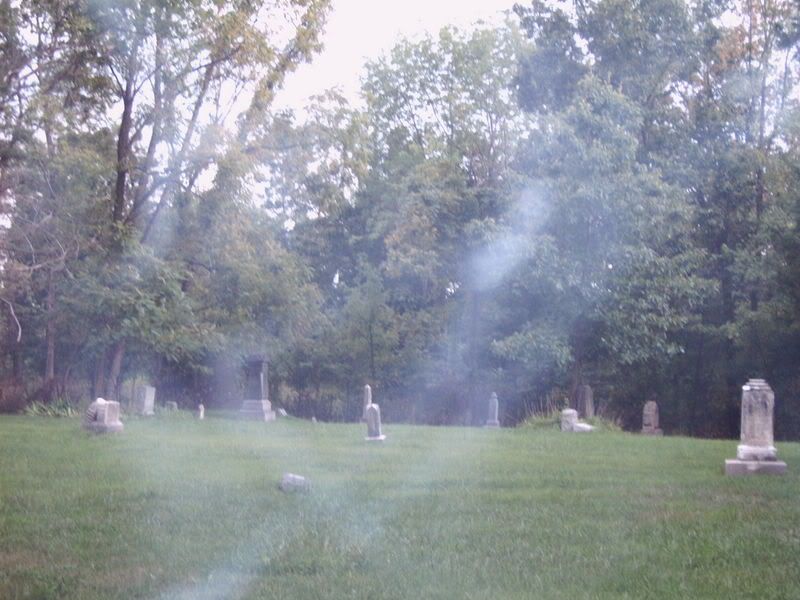Please post back here when you get a chance to enter inside the build and see what you can find and look around to see something inside then snap some pics too. Love to see what it looks like what's inside!
-
Haunt Master
Re: I went to a cemetery yesterday.
GREAT!!!!
Please post back here when you get a chance to enter inside the build and see what you can find and look around to see something inside then snap some pics too. Love to see what it looks like what's inside!
Please post back here when you get a chance to enter inside the build and see what you can find and look around to see something inside then snap some pics too. Love to see what it looks like what's inside!
- Rising Dead Man
- Halloween Master
- Posts: 3392
- Joined: Thu May 01, 2008 5:06 pm
- What is the highest number?: 9
- Location: Eerie Acres Cemetery
- Contact:
Re: I went to a cemetery yesterday.
Here is a picture of a tomb or mausoleum or something. It is at a cemetery I went to yesterday.


Halloween wraps fear in innocence,
As though it were a slightly sour sweet.
Let terror, then, be turned into a treat...
~Nicholas Gordon
As though it were a slightly sour sweet.
Let terror, then, be turned into a treat...
~Nicholas Gordon
- Rising Dead Man
- Halloween Master
- Posts: 3392
- Joined: Thu May 01, 2008 5:06 pm
- What is the highest number?: 9
- Location: Eerie Acres Cemetery
- Contact:
Re: I went to a cemetery yesterday.
Here is an epitaph on the right side of it. There is more at the front but I am not showing you that. If you want to see it just ask.


Halloween wraps fear in innocence,
As though it were a slightly sour sweet.
Let terror, then, be turned into a treat...
~Nicholas Gordon
As though it were a slightly sour sweet.
Let terror, then, be turned into a treat...
~Nicholas Gordon
-
Haunt Master
Re: I went to a cemetery yesterday.
Nice mausoleum!!! And, I see some names on the stone, something like that....
So, are you going to take risk yourself to go inside tonight?
So, are you going to take risk yourself to go inside tonight?
- Rising Dead Man
- Halloween Master
- Posts: 3392
- Joined: Thu May 01, 2008 5:06 pm
- What is the highest number?: 9
- Location: Eerie Acres Cemetery
- Contact:
Re: I went to a cemetery yesterday.
Here are the rest of them.
This stone is in front of the tomb.







Isn't this funny?
This stone is in front of the tomb.







Isn't this funny?
Halloween wraps fear in innocence,
As though it were a slightly sour sweet.
Let terror, then, be turned into a treat...
~Nicholas Gordon
As though it were a slightly sour sweet.
Let terror, then, be turned into a treat...
~Nicholas Gordon
- Rising Dead Man
- Halloween Master
- Posts: 3392
- Joined: Thu May 01, 2008 5:06 pm
- What is the highest number?: 9
- Location: Eerie Acres Cemetery
- Contact:
Re: I went to a cemetery yesterday.
Those are from the same cemetery with the mausoleum. No. I am not going to that place tonight. I have to wait until dad is up to driving over there. We take the road with the cemetery home every time I go to therapy. So I will go there next week.


Halloween wraps fear in innocence,
As though it were a slightly sour sweet.
Let terror, then, be turned into a treat...
~Nicholas Gordon
As though it were a slightly sour sweet.
Let terror, then, be turned into a treat...
~Nicholas Gordon
- HalloweenMelanie
- Master Reaper
- Posts: 167
- Joined: Sun Apr 27, 2008 5:02 am
- What is the highest number?: 9
- Location: Southern California
Re: I went to a cemetery yesterday.
During the Victorian era, when infant death rates, which before then had gone down, ironically went up due to more medical intervention but not as much knowledge of cleanliness/spreading of germs, it was common for people not to name their infants until they were at least several months of age.
The idea was that the infant had a fairly high chance of dying and supposedly, the parents would get less "attached" to the child if it wasn't named. Of course, the parents were "attached" anyway...but people had precious little at their disposal to buffer themselves against the possibility of tragedy, so this was the way things went for a while.
People often just called the baby "Baby" for its first weeks, months or even first full year of life.
When I lived in northern New Jersey, I visited cemeteries once in a while. There is actually something very peaceful about them. Generally, the farther back I went in the cemetery, the older the tombstones got as of course, the first burials would have taken place fairly close to the church, then spread out as more parisioners died over time. I saw a lot of infant tombstones. That was the only really sad part. Usually, there would be a last name..."Baby Girl Thompson, in God's Arms" or something like that...but I did actually see some first-name-only tombstones.
That was the only really sad part. Usually, there would be a last name..."Baby Girl Thompson, in God's Arms" or something like that...but I did actually see some first-name-only tombstones.
The tombstones with only the full name, or even just a first name or, as you saw, "Baby," were almost certainly the graves of very poor people, who couldn't afford anything but the sparest of engravings. Engravings used to be charged by the letter. They probably still are, at least in a general way (amount of space taken up in the engraving, etc.). I even saw some stones that were literally just a marker, with nothing on it at all.
The idea was that the infant had a fairly high chance of dying and supposedly, the parents would get less "attached" to the child if it wasn't named. Of course, the parents were "attached" anyway...but people had precious little at their disposal to buffer themselves against the possibility of tragedy, so this was the way things went for a while.
People often just called the baby "Baby" for its first weeks, months or even first full year of life.
When I lived in northern New Jersey, I visited cemeteries once in a while. There is actually something very peaceful about them. Generally, the farther back I went in the cemetery, the older the tombstones got as of course, the first burials would have taken place fairly close to the church, then spread out as more parisioners died over time. I saw a lot of infant tombstones.
The tombstones with only the full name, or even just a first name or, as you saw, "Baby," were almost certainly the graves of very poor people, who couldn't afford anything but the sparest of engravings. Engravings used to be charged by the letter. They probably still are, at least in a general way (amount of space taken up in the engraving, etc.). I even saw some stones that were literally just a marker, with nothing on it at all.
-
Haunt Master
Re: I went to a cemetery yesterday.
Very, very cool!!!! Love it!!!! 
Ok, just take your time when you go down into the underground build.
Ok, just take your time when you go down into the underground build.
- Rising Dead Man
- Halloween Master
- Posts: 3392
- Joined: Thu May 01, 2008 5:06 pm
- What is the highest number?: 9
- Location: Eerie Acres Cemetery
- Contact:
Re: I went to a cemetery yesterday.
I have never seen a blank stone.
Halloween wraps fear in innocence,
As though it were a slightly sour sweet.
Let terror, then, be turned into a treat...
~Nicholas Gordon
As though it were a slightly sour sweet.
Let terror, then, be turned into a treat...
~Nicholas Gordon
- HalloweenMelanie
- Master Reaper
- Posts: 167
- Joined: Sun Apr 27, 2008 5:02 am
- What is the highest number?: 9
- Location: Southern California
Re: I went to a cemetery yesterday.
In the very old cemeteries, they may be there, but covered with weeds or even just grass. They lie basically flush with the ground level so it's not hard to see how over the centuries this can happen. It's typically the oldest burials that have this and was only for the poorest of people (the stone would be "donated" by the church) and therefore it would be by the oldest graves--either in the very back of the cemetery, or closest to either the back or side of the church.Rising Dead Man wrote:I have never seen a blank stone.
Not that it's all that interesting to look for but just something I've noticed!
- Rising Dead Man
- Halloween Master
- Posts: 3392
- Joined: Thu May 01, 2008 5:06 pm
- What is the highest number?: 9
- Location: Eerie Acres Cemetery
- Contact:
Re: I went to a cemetery yesterday.
I have seen stones that look like plain old rocks sticking out of the ground. They are so old that is whats left of them. They are very small.
Halloween wraps fear in innocence,
As though it were a slightly sour sweet.
Let terror, then, be turned into a treat...
~Nicholas Gordon
As though it were a slightly sour sweet.
Let terror, then, be turned into a treat...
~Nicholas Gordon
- Rising Dead Man
- Halloween Master
- Posts: 3392
- Joined: Thu May 01, 2008 5:06 pm
- What is the highest number?: 9
- Location: Eerie Acres Cemetery
- Contact:
Re: I went to a cemetery yesterday.

I just remembered that I did see one blank stone. But I think it had words a long time ago but now it is so old they are all gone. See that other stone behind it? I think that is one of the stones that is so old it looks like a plain old rock. This is the same cemetery that has the Abe Lincoln stone.
Halloween wraps fear in innocence,
As though it were a slightly sour sweet.
Let terror, then, be turned into a treat...
~Nicholas Gordon
As though it were a slightly sour sweet.
Let terror, then, be turned into a treat...
~Nicholas Gordon
-
Haunt Master
Re: I went to a cemetery yesterday.
Wow! If that was cemetery stone, then it must be very, very old stone!! 
Maybe it must be around 1800's stone! Right now, all stones look very fancy than before!
Maybe it must be around 1800's stone! Right now, all stones look very fancy than before!
-
Haunt Master
Re: I went to a cemetery yesterday.
Yo RDM! A mysterious fog has recently fallen over the forest and the cemetery. You have to be careful! 
Maybe it's nothing, but this cemetery feels strange as you walk there...
Maybe it's nothing, but this cemetery feels strange as you walk there...
- HorrificHeather
- Crypt Keeper
- Posts: 71
- Joined: Fri Jul 04, 2008 1:59 pm
- What is the highest number?: 9
- Location: Graveyard
Re: I went to a cemetery yesterday.
I was on a ghost hunting team that just went to cemeteries. Thsi is one the the best pictures I ever got from Old Salem Cemetery in Lacon, IL


